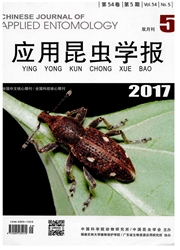

 中文摘要:
中文摘要:
在自然界,昆虫经常经历以几天为周期的重复高温。这种周期性重复高温对昆虫的影响主要有3种作用模式:周期性重复高温与对应恒温比较、昆虫的不同发育阶段经历不同的周期性重复高温和昆虫的一生经历不同的周期性重复高温。同恒温条件下的昆虫相比,重复高温作用后的昆虫生殖量降低、寿命延长。重复高温作用于昆虫不同生活史阶段导致的存活率不同,重复高温作用于昆虫的发育阶段越接近成虫,其生殖量越易受到影响。高温持续天数增多,昆虫存活率、生殖量降低;但一定范围内的高温天数有助于昆虫寿命的延长。重复高温对昆虫的影响程度还因植食性昆虫和天敌昆虫种类的不同而异。本文根据近年来的研究,结合相关的研究文献,从周期性重复高温的温度变化模式及这些温度模式对昆虫生态指标、内在机理等方面产生的影响进行了综述,并建议未来的研究将充分结合自然温度变化进行模拟,增强研究的实用性;扩大考察指标范围并建立考察指标问的联系,拓展研究对象。
 英文摘要:
英文摘要:
In natural environments, insects experience periodic repeated high temperatures on timescales of several days. Climate warming is predicted to increase the intensity, duration and frequency of extreme heat-waves and hot days. The implications are that studies of the impacts of periodic repeated high temperatures on insects over a timescale of days will become more feasible. Three broad groups of studies of the effects of periodically repeated high temperatures on insects have been employed: 1 ) comparisons between suitable constant temperatures and periodically repeated high temperatures; 2) investigations of the effects of different periodically repeated high temperatures occurring at different development stages; 3) investigations of the effects of different periodically repeated high temperatures occurring throughout the life of insects. Compared with suitable constant temperatures, repeated high temperature periods decrease insects' fecundity and increase insects' longevity. Insects have different survival rates in different development stages in response to repeated hot periods. Fecundity is more greatly reduced when exposed to repeated hot conditions during mature stages than when exposed during the immature stages. Increasing the number of continued hot days decreases survival and fecundity. Exposure to a certain number of hot days can, however, increase insects' longevity. Increasing the temperature and extending the duration of exposure to high temperature both decrease insects' survival, fecundity and longevity. The frequencies of periods of repeated hot days have impacts on insect populations and spatial distribution, but these are different in different species. Periodically repeated high temperatures increase insects' levels of Hsp70 expression, and insects' fatty acid composition differs significantly between those in constant temperatures and those subjected to periodically repeated high temperatures. However, there is a lack of studies on the impacts of periodically repeated hi
 同期刊论文项目
同期刊论文项目
 同项目期刊论文
同项目期刊论文
 期刊信息
期刊信息
